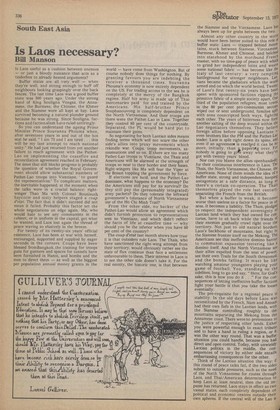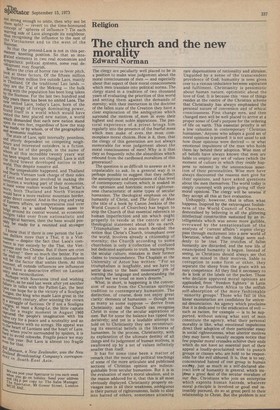Is Laos necessary?
BM Manson
Is Laos useful as a cushion between enemies — or just a bloody nuisance that acts as a tinderbox to already heated arguments?
Buffer states are all very well — when they're well, and strong enough to buff off neighbours looking graspingly over the back fences. The last time Laos was a good buffer state was 300 years ago. Under the strong hand of King Souligna Vongsa, the Annamese, the Burmese, the Chinese, the Khmer and the Siamese were all kept at bay. Laos survived becoming a natural plunder ground because he was strong. Since Souligna, factions and factionalism have ruled untiringly.
So you can understand the ageing Prime Minister Prince Souvanna Phouma when, after seventeen years in and out of the hot seat he said, " I am 73 and I am tired .. . this will be my last attempt to reach national unity." He had just returned from yet another failure to reach agreement with the PathetLao on implementing the ceasefire and reconciliation agreement reached in February. The issue that still blocks progress is probably the question of whether the Royal Government should allow substantial numbers of Pathet-Lao troops into Vientiane, to guard the representatives.' To complicate matters, the inevitable happened, at the moment when the talks were in a crucial balance: rightwinger Thao Ma with Colonel Bounleutb Saycocie and sixty helpers staged a coup d'etat. The fact that it didn't succeed did not mean it failed. Probably this factor set the whole negotiations on edge again. Ma, who would hate to see any communists in the cabinet, or in uniform in the capital, got what he wanted, and Laos lost again the thread of peace waving so elusively in the breeze.
For twenty of its twenty-six years' official existence, Laos has been at war with herself, encouraged, supported and supplied by eager seconds in the corners. Coups have been blessed fromBangkok, the training for troops guns for gunners and spaces for tunnels have been furnished in Hanoi, and bombs and the men to direct them — as well as the biggest per population annual money grants in the world — have come from Washington. But of course nobody does things for nothing. By granting favours you are indebting the receiver a thousand times. Souvanna Phouma's economy is now entirely dependent on the US. For trading access to the sea he is completely at the mercy of the Bangkok regime. Half his army is made up of Thai mercenaries paid for and trained by the Americans. His half-brother Prince Souphanouvong is completely dependent on the North Vietnamese. And their troops are there were the Pathet-Lao in Laos. Together they control 80 per cent of the countryside. Separated, the PL would be hard put to maintain their gains.
So negotiating for both Laotian sides means finding terms which will not scare the other side's allies into proxy movements which rekindle war. Coups, troop movements, assassinations and so on. If there are too many Pathet-Lao troops in Vientiane, the Thais and Americans will be alarmed at the strength of troops so near to their border and their bases. Right-wingers like Ma will fear the Viper at the Breast toppling the government by force.
If elections are held, and the Pathet-Lao dominate, what happens to the economy? Do the Americans still pay for its survival? Do they still pay the (presumably integrated) army packets? Do they tolerate the leftward govenment's tolerance of North Vietnamese use of the Ho Chi Minh Trail?
From the other side, no backer of the Pathet-Lao would allow an agreement which didn't furnish protection to representatives sent to Vientiane, and which didn't reflect the facts of life at ceasefire time — why should you be the inferior when you have 80 per cent of the country? The coup d'etat last month shows how true. it is that outsiders rule Laos. The Thais, who have sanctioned the right-wing attempt from their territory, would obviously rather see the state of flux continue than face a settlement unfavourable to them. Their interest in Laos is to see the other side doesn't take it. For the real emnity,. the historic one, is that between the Siamese and the Vietnamese. Laos has always been up for grabs between the two.
Almost any other country in the world, would have been better suited to this role 01 buffer state. Laos — trapped behind moun' tains, stuck between Siamese, Vietnamese. Burmese, Khmer and Chinese, and belched into statehood by the moribund French master, with no time-gap of peace with which to grind her independent loins and weave some national fabric — has become like the Italy of last century: a very tempting battleground for stronger neighbours. Lao; tians became the gladiators which the world armed and on which the world betted. TwentY of Laos's first twenty-six years have bee° spent with sponsored factions ripping the primitive fabric of a simple society apart. One third of the population refugees, most toWnS in the 80 per cent pro-communist sector wiped out or sent underground, families Olt with sons conscripted both ways, fighting each other. The years of bitterness now forni another salting of the deep wound within the Lao negotiators themselves. They believe foreign allies before opposing Laotians even brothers like the PM and the Pathet-1-8°, leader. Laos is split right down its spine, ao even if an agreement is reacted it can be n° more, initially, than.1paperieg over. Foe nobody is going to gire away what they've got with twenty years' blood. Nor can you blame the allies openhandedlY for their continuous interference in Laos. The Thais, the North Vietnamese, the Chinese, the Americans. None of them minds the idea of ° buffer state, strong and independent, keeping antagonists at a safe distance, as long 8.5 there's a certain co-operation. The Thais themselves played the role last centurY. separating the French from the British. But when a buffer is weak, it becomes worse than useless as a factor for peace in a°, area. It becomes a liability. The Thais, pledge°, to respect the independent sovereignty 0' Laotian land which they had owned for cen; tunes, have to sit back while the friends 01 their enemies gradually crawl right over the territory. Not just to old natural borders. Laos's backbone of mountains, but right to the Siamese frontier itself on the Mekong. The Americans see this ineffective domino barrier to communist expansion teetering like a domino itself. And the North Vietnamese see their allies expelled from the seat of power see their own Trails for the South threatened, and the bombs falling. It must be like watching amateur youngsters playing your game of football. You, standing on the sidelines, long to go and say, "Here, for God's sake, this is how you do it . ." For the consequences of letting ineffective buffer factions fight your battle is that you take the losses eventually. The pre-requisite for a regional peace lS stability. In the old days before Laos was reconstituted by the French, Siam and Annain had their own fiefs in the Laotian lands, with the Siamese controlling roughly to the mountains separating the Mekong from the Annamese coast.Therewereno pretensions to the justice of respecting other lands. Either you were powerful enough to exact tribute and to have a hand in ruling a region, or it was the other way round. That was a buffer situation you could handle, because you had direct and open control. Today, with unwieldY Laotian politics in the middle, the consequences of victory by either side entails embarrassing consequences for the other. ' Think of the Laotian situation this way: if this round of peace talks fail, if the two sides submit to outside pressures, such as the need of the North Vietnamese for routes through Laos, and Thai/American determination to keep Laos at least neutral, then the old impasse has returned. Laos stays in effect as two vassal states, each completely dependent on political and economic centres outside their own spheres. If the central will of the Lao is
not strong enough to unite, then why not let them split? — revert to the time-honoured concept of spheres of influence '? Tie each warring side of Laos alongside its neighbour, thus recognising the influence to the east of the Vietnamese and to the west of the Siamese. So that the pretend-Laos is not in this peranent kneeling position. So that as integrated elements in two real economies and
sYMpathetic political systems, some real development may flourish.
Before the cries of horror rise to fever pitch, look at these factors. Of the fifteen million ,Lao, thirteen million live outside Laos, mainly
in 'fhailand. Of the traditional Lao lands — th,eY are the T'ai of the Mekong — the bulk L!long with the population has been long taken nY the Siamese. For the last two hundred and 4ftY Years there has been no united Laos. The
hew united Laos, today's Laos, born of the
Path pangs of foreign dominating power, nund itself in a world which would have tested the best placed new nation, a world Which demanded that each new nation stand upon its own feet, regardless of how the map Was made, or by whom, or of the geographical and economic realities.
The state of Laos, split internally, penniless, nd utterly dependent on competing neigh
ut'urs and interested outsiders, is a fiction. And the lot of the people, in the name of ha Omall this incredible twenty years' war been waged, has not changed. Laos is still me third lowest developed nation in the
workl. This despite massive aid. If the unspeakable happened, and Thailand and North Vietnam took charge of their sides tlf Laos and became involved in making the O a working part of their economies,
at least Some realism would be faced. What's ore, both Thailand and North Vietnam .vould have a more realistic mountain border,
under direct control. And in the ying and yang of
theEastern affairs, as temperatures cool over bui Years, as a united Vietnam eases to
b..ge around its central wound, as economic iclidges take over from nationalistic and
siIugical barriers, then the base would pos Lao be made for a reunited and stronger know that if there is one person the Lao,11411 dislikes more than a Thai, it is a Viet ::41ese — despite the fact that Laos's corn n:rce is run entirely by the Thai, the Viet()Mese and the Chinese. But if there are cries
the ' Never! " then so much the better. For in
end the will of the Laotians themselves 7.1,1 be the factor that unites them. At this 'y'Llr.nent, all outside influences are influences u,;!Ich have a destructive effect on Laotian
and reconciliation. torerhaps with Souvanna tired and wishing
rauretire, as he said last week after yet another La tire in talks with the Pathet-Lao, the best vo°„s can hope for is the victory of a Souligna se_ggsa, the king who made Laos great in the
1,venteenth century, after winning the crown a struggle of factions. Or if not a Souligna .Xgsa, at least a Kong-Le, the little captain
f a for a magic moment in August 1960 Ilal?,t,ured the people's imagination with his inicCe Cry for a peace and a neutrality and an to ,eyendence with no strings. His appeal was 4tkirie heart of Laotians and the heart of Laos. 1145 When you're surrounded by spiders, it is ,(.,e 'u to avoid cobwebs. Fragile peace we may this Year. But Laos is almost too fragile eti for that. ilia As ZeciCanson, a New Zealander, was the New cie.,nd Broadcasting Company's corresponin South-East Asia.

































 Previous page
Previous page